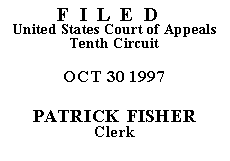

| LEWIS LAVERN SETLIFF,
v.
R. MICHAEL CODY |
No. 97-6144
(D.C. No. 95-CV-962) |
In Barefoot v. Estelle, 463 U.S. 880 (1983), the Supreme Court held that "a certificate of probable cause requires petitioner to make a substantial showing of the denial of a federal right." 463 U.S. at 893 (citations omitted). This requires that the petitioner demonstrate that the issues presented are debatable among jurists of reason, that a court could resolve the issues differently or that the questions deserve further proceedings. See id. at 893 n.4. After careful examination of petitioner's application, the district court's order and the magistrate judge's report and recommendation, we conclude that Mr. Setliff has failed to make the required showing. Consequently, petitioner's request for a certificate of probable cause is DENIED and the appeal is DISMISSED. The mandate shall issue forthwith.
ENTERED FOR THE COURT
Carlos F. Lucero
Circuit Judge
*.The case is unanimously ordered submitted without oral argument pursuant to Fed. R. App. P. 34(a) and 10th Cir. R. 34.1.9. This order and judgment is not binding precedent, except under the doctrines of law of the case, res judicata, and collateral estoppel. The court generally disfavors the citation of orders and judgments; nevertheless, an order and judgment may be cited under the terms and conditions of 10th Cir. R. 36.3.
1.The Supreme Court, in Lindh v. Murphy, 117 S.Ct. 2059, 2068 (1997), holds that the new provisions of 28 U.S.C., ch. 153, which includes the § 2253(c) certificate of appealability requirement, added by the Antiterrorism and Effective Death Penalty Act of 1996 (AEDPA), are generally not applicable to cases filed before AEDPA's effective date, April 24, 1996. See United States v. Kunzman, No. 96-1310, 1997 WL 602507, at *1 n.2 (10th Cir. Oct. 1, 1997) (en banc). This circuit has therefore held that § 2254 petitioners who filed their petitions in district court prior to the effective date of AEDPA, as in this case, do not need a certificate of appealability. Id. Petitioner, however, is subject to § 2253's previous requirement that he obtain a certificate of probable cause to appeal. 28 U.S.C. § 2253 (1994) (amended 1996).